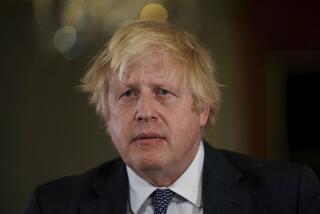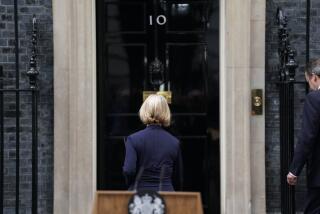For Blair Government, Danger Is Internal Affair
- Share via
BRUSSELS, BELGUIM — If Oscar Wilde was right that to lose one parent was a misfortune, but to lose two smacked of carelessness, then Prime Minister Tony Blair has been careless indeed. With approval ratings consistently above 70%, he may be the most popular British prime minister since opinion polls began, but the holes in his Cabinet are gaping.
Late last year, he lost his secretary for Wales, after a still-mysterious encounter with a chap in a London park that left the minister short of his car, his wallet, his dignity and his political career. Just before Christmas, Blair’s secretary for trade and industry, Peter Mandelson, and his paymaster general, Geoffrey Robinson, also resigned, a double disaster that is best explained by the resignation last week of a humble press secretary to the powerful chancellor of the Exchequer.
In American terms, this is like attributing the fall of the commerce secretary and a top White House aide to some dirty work inside the Treasury secretary’s public-relations team. It would suggest something akin to civil war in the heart of the administration, and that is precisely what is happening in Britain.
There are some curious and fascinating characters involved in this tale of intrigue, starting with the former Communist, trade-union official and soccer fanatic Charles Whelan, probably the most foulmouthed press spokesman I have encountered in three decades in journalism. I have yet to hear him utter a sentence without the F-word liberally spattered throughout, as adjective, verb, noun and plain expletive.
Whelan was the press spokesman and close personal aide of Gordon Brown, who, as chancellor of the Exchequer, runs the British economy. Brown, son of a Scottish pastor, has always been closer to the old socialist traditions of the Labor Party of the working class and the trade unions than the more Clintonesque Blair. Blair, like Bill Clinton, is a post-ideological figure, who understands that the only way left-of-center parties can win modern elections is to appeal to the vast mass of middle-class voters.
So the political tensions between old Labor, the horny-handed sons of toil singing the “Red Flag” over their flat beer, and new Labor, where chaps in Armani suits call their brokers on cell phones while sipping chardonnay, lie at the heart of the British crisis. But personal rivalries add a dash of spice and malice to the mix.
Brown has always believed that he should be prime minister rather than his former protege, Blair. Whelan shares this view and, like his master, blames Blair’s victory on the dark arts of Mandelson, who made his name as Labor’s campaign strategist and media guru.
Mandelson is the British equivalent of former Clinton aides George Stephanopoulos, James Carville and Dick Morris rolled into one. And indeed, he was a key figure in fostering the close political ties between the Clinton White House and the Blair team. Though genetically rooted in the old Labor heritage (his grandfather was a minister in the historic Labor government of 1945-51), Mandelson is the arch-modernizer, the man who replaced the Red Flag with the red rose as New Labor’s symbol.
Throughout the 1980s, Mandelson was a supporter of Brown and, as the party communications chief, was perfectly placed to help steer Brown into the party leadership when the previous leader, John Smith, died of a sudden heart attack in 1994. Indeed, copies were published last week of Mandelson’s private memos to Brown at that time, about his strategy to secure the leadership.
The problem was that Mandelson then knew, from opinion polls and from consulting leading Labor MPs, that while Brown could probably win Labor’s own internal election for the leadership, Blair would be a far more attractive party leader in the general election. Bluntly, Blair could put Labor into power; Brown might be old-fashioned and dour enough to lose it. Mandelson therefore switched sides and backed Blair for the leadership.
Brown and his supporters never forgave him. It was at this time that Whelan began calling Mandelson the “prince of darkness.” The feud has festered throughout the Blair government’s 18 months in office, despite the fact that as the two most pro-European Cabinet ministers, who both want Britain to join the new European single currency, Brown and Mandelson should have been natural allies.
The feud came to a head because Whelan had an old friend, a political journalist, Paul Routledge. He had written a friendly biography of Brown, and has, for the past year, been working on a far less friendly biography of Mandelson. This book was eagerly awaited by Britain’s political insiders.
Political gossip aside, there were two areas where Mandelson was deemed vulnerable. The first was his discreetly gay private life, which would not much matter in the relaxed sexual atmosphere of modern Britain, as long as it did not affect his ministerial duties. When Mandelson was “outed” by a journalist for Rupert Murdoch’s the Times on a TV show, even the campaign against the “gay mafia” in Murdoch’s tabloid the Sun did not shake Mandelson off his perch in the Cabinet.
The second was more troubling. Mandelson is not rich. Until last autumn, when he was finally given a real job in the Cabinet, he earned $65,000 a year as a member of Parliament. There was some curiosity, therefore, when he bought an elegant, $750,000 townhouse in London’s fashionable Notting Hill Gate and furnished it with state-of-the-art furniture of the latest British design. Mandelson waved aside questions, talking vaguely of a family inheritance and the profit from the sale of his old (and modest) apartment in distinctly unfashionable Clerkenwell.
Routledge knew better. But before Routledge could publish his revelations, the Guardian beat him to it. It devoted its entire front page to photos of Mandelson, Robinson and Mandelson’s new house and broke the story of Mandelson’s $626,000 loan.
The loan had come from Robinson, the paymaster general (and only multimillionaire) in the Labor government, who is the former head of the Jaguar car company. The 1996 loan was never made public. Neither the prime minister nor the senior officials who are supposed to be informed of ministers’ private financial arrangements were told of it.
Robinson is a generous man. As well as helping his friend Mandelson live in a style to which he wished to become accustomed, he also funded the private office and economic think tank that helped Brown prepare to run the British economy before the 1996 election.
Mandelson and Robinson have both now resigned, followed by Whelan, who went off swearing (without expletives) that he had not leaked the story of the loan. Brown remains in office, presiding over a British economy sinking into recession. Blair went on holiday to the Seychelles Islands, and then on a working trip to South Africa. His poll ratings remain high, the newspapers are now full of the next royal wedding and the government insists “it is time to put all this behind us.”
Not so. The poison of personal animosity and vengeance still runs through the Labor government’s bloodstream. The tension between new Labor, which can win elections, and old Labor, which can mobilize the party and the labor unions, remains unresolved. Crises loom, from the prospect of the Scottish National Party winning the next Scottish election on a demand for independence from Britain, to the festering row over Britain’s relations with Europe. The media and the opposition parties are sniffing blood. Wilde had a phrase for this, too, from “The Importance of Being Earnest”: “This suspense is terrible. I hope it will last.”
More to Read
Sign up for Essential California
The most important California stories and recommendations in your inbox every morning.
You may occasionally receive promotional content from the Los Angeles Times.













